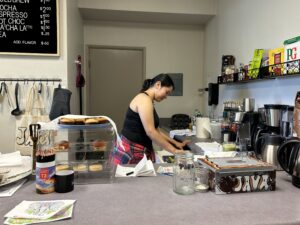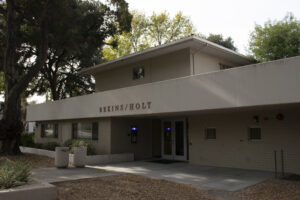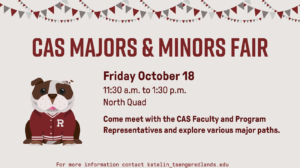
Resident Assistants play an important role in dorms as leaders and responsible adults, but the extent of their duties remain unknown to most. As the opening for applications approaches, reporter Madelyn Olsen covers the who, what, where, when, and why of RAs and how to become one.
When you moved into your dorm, one of the first people you might have met was your Resident Assistant (RA). They introduced themself and started to get to know you before moving on to welcome other residents of the hall. You’ve met them, but do you know what they do?
What is a Resident Assistant?
Some students joke that RAs are “just hall monitors that get paid,” but at the University of Redlands, RAs are much more than that.
Yessenia Sanchez, the Assistant Director of Housing Operations for Residence Life and Housing (RLH), defined RAs to be “paraprofessional staff members who are responsible for enhancing the quality of life of all students in the residential communities, with specific emphasis on fostering community and being attentive to the safety and security of our residents.”
The average hall monitor probably isn’t trained in Cardiopulmonary Resuscitation (CPR), Diversity Equity and Inclusion (DEI), time management, program curriculum, mediation or de-escalation. But RAs are, according to Sanchez.
Before starting their job, RAs must attend a two-and-a-half week training in August and a refresher course in January. On top of this, they hold weekly meetings where their training is reviewed and expanded upon.
More than being responsible for residents’ security, they are leaders and role models for their halls. The RA of the second floor of Merriam, Emmett Borton ’26, said that RAs, in addition to being responsible for their residents’ safety, ensure their residents are acclimating to campus life.

Duties of Resident Assistants
You’ve likely heard the phrase, “RA on duty, everything alright in here?” At night, RAs do rounds of the dorms and check the bathrooms, using that phrase before entering the bathroom. If they hear an answer they move on with their rounds. If not, they go into each bathroom stall to ensure that nothing is broken and no one is potentially incapacitated, Borton shared.
These rounds are part of being ‘on duty,’ Borton explained. On-duty shifts span from 7pm to 7am and when it comes to deciding who is on duty for a particular day, schedules are drawn up at staff meetings. Duties are shared among RAs in dorm groupings. For instance, the freshmen dorms are one grouping, and the dorms on the quad are another.
“We have eight RAs on staff [for the freshmen dorms]… we just try to schedule so that everyone has an even number of days,” Borton said.
Being ‘on duty’ entails doing rounds twice in a night for weekdays and three times in a night for weekends.
“I don’t mind duty rounds until they’re on the weekend because on the weekend we have to do three of them and the last one has to be after quiet hours [at 1am]. Having to be up that late on a weekend round is my least favorite part [of being an RA],” Emmett added.
Along with checking bathrooms, the on-duty RAs completing their rounds check all common areas and fire extinguishers. They ensure there are no policy violations and that all residents are safe.
RAs are also the first resource for students having a roommate conflict. At the beginning of the year, they meet with residents to form roommate contracts. These contracts become necessary when conflicts arise, or if students want to consider switching rooms. RAs collect and report information shared by students. Then, if necessary, they hold a roommate mediation meeting, where issues are addressed. This falls under their duty of ensuring that students are acclimated on campus and feel safe.
Once an RA is aware of an issue, so long as it doesn’t require immediate intervention, around two weeks are given to allow for the residents to resolve it amongst themselves. Sanchez called this a “standard process for roommate conflicts.”
RAs are deeply involved in their dorm community, being a constant mediator between residents.
Inside the Life of a Resident Assistant
Like many RAs, Borton finds the job of an RA to be enjoyable and well-paying, despite the challenge of finding a balance between work and personal life.
“I always say ‘RA hat on’ or ‘RA hat off,’” Borton shared. This is a common phrase RAs use to help create the necessary division between work and off-time. They use it to remind residents or friends that they have a duty to report anything they hear that violates community standards. “You’re free to do whatever you want but as soon as I’m made aware, I am responsible for it.”
RAs take their jobs seriously and report whatever comes to their attention, especially alcohol or drug use. “Sometimes my RA hat has to go on no matter what because we’re a federally funded campus so we can’t have any marijuana use. Anytime I see or smell [marijuana] I have to document it, call Public Safety, and go through the protocols,” Borton added.
Due to the rigor and responsibility of being an RA, the job isn’t a good fit for everyone. “Sometimes you can get thrown into situations you weren’t prepared for and sometimes you have to think on your feet. You’re not always going to say the right thing and do the right thing. You have to be ready to handle stressful situations with little to no warning,” Borton explained.
Despite this, Borton shared that he enjoys his job immensely.
“My favorite part of the job is getting to meet a lot of people. Being an RA, I see all the people on all the floors. I do my best to interact and know the faces and names. I try to know a large pool of people,” Borton said.
The Hiring Process
“We accept any application as long as they meet the criteria,” Sanchez said.
One such criterion RLH checks is academics. Those applying must have a GPA of at least 2.5. More important to the selection process, however, is the attitude and work-ethic of individuals applying.
“They need to be responsible, remain calm under pressure, be a good role model and be able to successfully build community in our buildings,” Sanchez added.
When it comes to selecting candidates for the position of RA, a big factor RLH considers is the diversity of the campus. They want to ensure that the team of student leaders in the dorms represents the student body.
Becoming an RA is a competitive process. Sanchez shared that last year RLH received forty-six applications. Of those forty-six, only twenty-seven were accepted. This includes the applications received from current RAs applying to be rehired the subsequent year.
“From my understanding it’s the same application, same process, same timeline,” Borton shared. There exist small differences like the content of the interview and tweaks to the application requirements, but in general everything is the same.
One such unchanging part to the application is hall placement. All applicants are asked what halls they would like to be placed in during the hiring process. While seniority is a factor in normal student housing, with room draw being open to current Juniors first and incoming Freshmen last, RAs are generally placed wherever their skillsets are needed. Still, RLH does their best to accommodate hall placement requests.

How to Apply
Students interested in applying to be a Resident Assistance should visit the university’s page about RA applications, linked here. It lists the dates and times for the info sessions, the first of which is coming up on Nov. 13 from 7 p.m. to 8 p.m. in Gregory 272.
Any questions not answered on the website regarding how to apply to be an RA can be directed to RLH@redlands.edu.
Prospective applicants must attend an info session, submit their application, and attend both an individual and group interview in order to be considered for the job.
Despite their list of requirements, RLH encourages every interested student to apply to be an RA.
“We don’t want any prospective candidate to be daunted by the application process,” Sanchez said, “We welcome anyone.”
While the job is intense, it is rewarding. Students interested in a leadership position on campus that requires time management, cooperation and compassion may find the position of a Resident Assistant to be right for them.
Madelyn Olsen is a second-year student majoring in Saxophone Performance and is the current Editor-in-Chief of The Redlands Bulldog. She loves writing, making music, and taking care of her chickens in her free time.




